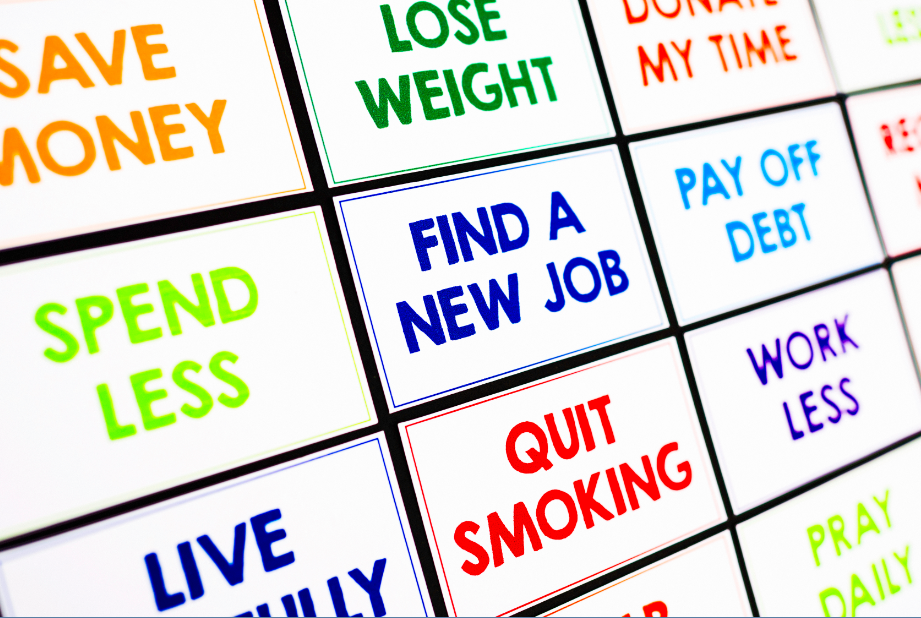How to Break Bad Habits


Ask someone for advice about how to break a bad habit and watch their eyes LIGHT UP.

Immediately, they'll say, Oh! You should try this new app! or, You should definitely read this book, or overwhelm you with a long list of tips that worked for me! The thing is, we already KNOW what we should do. But there's more to changing a habit than learning more information.
Maybe you want to stop procrastinating, eating junk food, or spending money. Is it just the information you need?
For the most part, we already know all the conventional advice:
- To stop procrastinating, put to-dos on a calendar
- To stop eating junk food, substitute with healthier options
- To stop spending money, create a budget and stick to it
All these "tips" sound logical. They sound like they should work. And yet the tips alone doesn't lead to radical change.
What we actually need is a system that guarantees we follow through on our goals.
- Step 1: Get over past failures -- for good
- Step 2: Recognize how habits actually work
- Step 3: Choose your reward to create lasting change
- Step 4: Replace bad habits (why "quitting" does'nt work)
- Step 5: Get back on track when progress stops
Step 1: Get over past failures -- for good
When we can't seem to follow through on our goals and break old habits, a lot us needlessly beat ourselves up. We think "well, if I just try harder" or "if I stop being so lazy" then I could make a change.
And when we don't follow through, we feel guilty. Why do we do this? Guilt is the least productive emotion. It doesn't help us move forward. It just makes us feel bad.
Let's drop the guilt. It's not our fault. We're not weak or incapable of change. If we're not losing weight, not spending quality (distraction-free) time with our families, or not doing anything else we want life, it's usually because we don't understand how to design our habits correctly.
So before moving on to the next section, decide that for at least the next week, you'll try to catch yourself whenever you use "guilty" language. Then, instead of beating yourself up, slightly alter your negative language into something more positive and productive.
Like this:
- Instead of "I'm so lazy" try "I'm human. Everyone struggles with this."
- Instead of 'I'm going to fail" try "I'll be fine. Even if the worst case scenario happens and I do fail, I'll still be ok."
- Instead of "I should do X?" try "I'd like to do X."
- Instead of "I am not the kind of person who?" try "What if I tried to?"
Once you internalize this, you make changes easier on yourself and a lot more FUN.
Step 2: Recognize how habits actually work
Every habit has three components:
- A cue, which is a trigger for a behavior to start (like your alarm clock going off)
- A routine, which is the behavior itself (like getting out of bed)
- A reward, which is the benefit of taking that course of action (like a nice, warm cup of coffee waiting for you when you get out of bed)
The reward is how our brains actually learn to want a particular behavior in the future. We put 2-and-2 together and equate the pleasure of a cup of coffee with getting out of bed.
That's how people pick up bad habits, like smoking, but it's also how people stick to good habits like exercising. They link a cue and routine to a reward.
For decades people focused exclusively on changing the behavior, the routine itself.
But we now know that cues and rewards are actually the most important parts of making a habit stick. If you get the cues and rewards right, the routines form by default.
That's why, for example, eating more chocolate could help you exercise more.
Step 3: Choose your rewards to create lasting change
Yes, you read that right: Research has shown that eating more chocolate can help you exercise more.
Here's why: Eating chocolate at the end of a workout is a simple way to ignite the reward centers in your brain and cement the good feelings that are required for a habit to take root.
It sounds contradictory (that eating chocolate can help you exercise more), but it's true.
I recently sat down with Charles Duhigg, author of the book The Power of Habit (arguably the best book on behavioral change in modern times), to talk about how to create new habits.
And in this part of our chat, he explains just how important rewards can be to break a bad habit (even something random like eating chocolate to workout more) and how you can choose your own rewards to make new habits stick.
Your turn to break that bad habit: What's habit do you want to start? What will you do to reward yourself for taking action on this? It's important that you plan this in advance. For example, you don't want to end your workout, leave in a rush and not be able to reward yourself with a smoothie or a relaxing shower. You want to ensure that you can give yourself a reward to make sure the behavior sticks.
Here are some sample rewards you might use:
- Giving yourself 5 minute breaks for every 20 minutes of deep work you do.
- Allowing yourself to buy a nice pair of shoes after you hit your savings goal for a month
- Watching a TV show (guilt-free) after cooking a healthy meal
The reward can be anything you choose, as long as you're giving yourself something you genuinely enjoy.
Step 4: Replace bad habits (why quitting doesn't work)
It's very hard to simply break a bad habit. That's because we're still getting whatever cue was telling us to do the bad habit in the first place, and we're wired to know the bad habit will give us an immediate reward.
We're much more likely to be successful if we change a bad habit into a better behavior.
Here's an common example: A lot of us tend to look for something sweet to eat right after lunch. We hit the vending machine for chocolates, cookies, or some other sweet to fix our craving.
Because, yes, sweets and desserts taste good, but a habit is much more complicated than that.
- Maybe getting that sweet give us a burst of energy from the sugar so we can push through the rest of the day.
- Or maybe we're not ready to go back to work so getting up for a snack gives us a chance to walk around the office and chat.
It's not just the sweet that's creating our behavior. There's a whole series of reasons that surround it.
Instead of just giving up the sweets, maybe we could try getting up from our desk and eating an apple instead. Or maybe, if it's the energy from the sugar that we're craving, a cup of coffee will do the trick.
The important thing to note is that we're not stopping cold turkey. Instead, we're replacing a "bad habit" with a new, better one.
Decide what your replacement habit will be and commit by writing it down. Any time your old behavioral pattern pops up, do this habit instead.
Here are some ideas to get you started:
- If you're drinking too much coffee, drink a decaffeinated tea instead.
- If you tend to overeat when you're feeling stressed, chew gum after you've eaten your regular portion of food.
- If you always hit the snooze button on your alarm clock in the morning, move your alarm to the other side of the room so you have to get out of bed to hit snooze.
Step 5: Get back on track when progress stops
Even the best laid plans sometimes fail. That's life. When we're trying to form a new habit, interruptions to our new routine can break the cue-routine-reward cycle.
But these setbacks don't have to knock us permanently off course. Often, we can get back on track with some very simple fixes.
Here's how to KEEP a habit going once you've created it (in less than 3-minutes).
What about you? Once you start your new habit, how will you keep doing it? It's important to plan ahead for this so if your momentum temporarily stops, you don't get permanently off track.
Some things you could do:
- Set up a quarterly review to see how you're doing (with google alerts in your calendar system)
- Get an accountability and support partner (could be a friend or spouse)
- Make a public commitment (by posting to Facebook or simply telling all your friends)
- Create a "why" for why you actually want to make this change
How 15 Top Performers Created Good Habits
Where can you start?
I asked some of the world's top experts -- people like Neil Patel, Noah Kagan, BJ Fogg and Josh Kaufman -- to share some of the life-changing habits and tests they've created in their own lives.
You can implement most of these in just a few minutes.
I put them together in this free guide for you.
The Ultimate Guide to Habits
It covers everything from habits on how to be more productive, to getting into better shape, to generating explosive growth in your business and career.
Grab your free copy so you can start building massively successful habits into your own life.